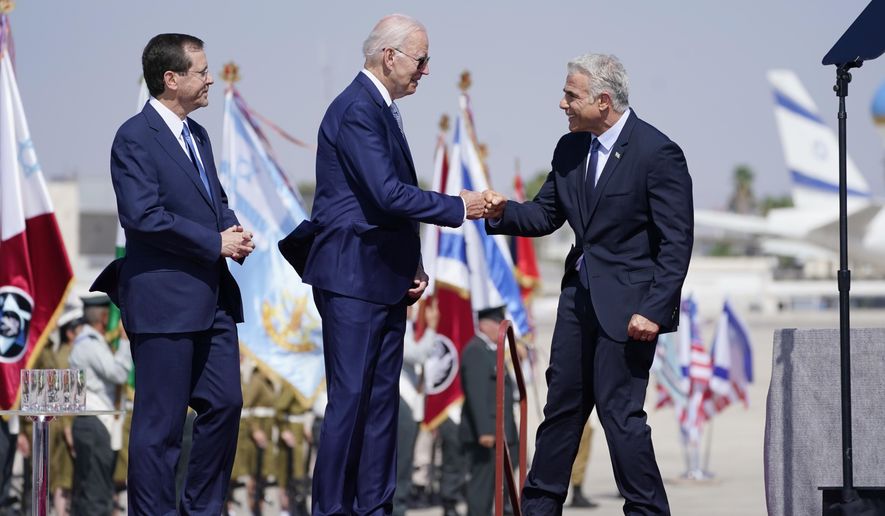President Biden kicked off a high-stakes trip to the Middle East on Wednesday with a visit to Israel, the first stop on a diplomatic mission to bolster U.S. ties to the region, facilitate growing ties between the Arab world and the Jewish state, and get some help on soaring world energy prices and the challenge posed by Iran.
Mr. Biden was greeted by Israeli President Isaac Herzog and Prime Minister Yair Lapid as he exited Air Force One for a three-day trip, his first visit to the region since taking office 18 months ago.
“The connection between the Israeli people and the American people is bone deep,” Mr. Biden said shortly after landing in Tel Aviv, the first stop of his Middle East tour. “Our relationship with the state of Israel is deeper and stronger, in my view, than it’s ever been. And with this visit, we’re strengthening our connection even further.”
“We’re simply happy to see you, Mr. President, the simple, genuine joy of seeing a good friend once again,” Mr. Lapid said, a caretaker prime minister as Israel’s deadlocked parliament once again prepares for national elections this fall.
Mr. Biden is also scheduled to meet privately with longtime former Prime Minister Benjamin Netanyahu on Thursday, who is hoping the coming elections will restore him to power after a year in opposition. Mr. Biden told an Israeli television interviewer he was ready to work again with Mr. Netanyahu should he win the coming vote, despite past tensions between the two men.
Mr. Biden is also visiting a country, Israel, that was highly supportive of his predecessor, according to recent polls. Former President Donald Trump was a strong supporter of Israel’s security and its territorial claims and helped engineer a string of agreements for Arab governments to recognize the once-isolated Jewish state.
The White House says Mr. Biden is looking to make “material progress” on issues like Israel’s security in the Middle East and high energy prices. At the same time, aides have tried to lower expectations for the trip, saying it could take months to reach a deal on those issues.
White House National Security Adviser Jake Sullivan said the president will also reprise his “long-standing commitment” to a two-state solution to the Israel-Palestinian conflict. He said it is the best path to a viable state of Israel and “a Palestinian state where Palestinians can live in freedom and dignity.”
“He won’t be making formal proposals for the launch of some new peace initiative, what he will do is try to encourage both sides to find a pathway where step by step they move closer towards a vision that works for both Israelis and Palestinians and the region as a whole,” Mr. Sullivan said.
One point of contention in both Israel and Saudi Arabia could be the Biden administration’s continuing push to revive the 2015 Iran nuclear deal, with both governments opposed and which President Trump repudiated in 2018. Mr. Biden in the television interview said he remained committed to the deal, which curbs Tehran’s nuclear programs while lifting punishing international sanctions, arguing Wednesday, “The only thing worse than the Iran that exists now is an Iran with nuclear weapons.”
While in Tel Aviv on Wednesday, Mr. Biden will receive a briefing on the Iron Dome and Iron Beam defense systems. He also paid his respects to the 6 million Jewish people that the Nazis murdered during World War II at the Yad Vashem Holocaust memorial in Jerusalem.
Mr. Biden watched the laying of a wreath and lit the eternal flame in the Hall of Remembrance at Yad Vashem, but did not make any public remarks. He also spoke briefly with Gita Cycowiz and Rena Quint, two American Holocaust survivors.
Upon leaving, Mr. Biden signed the guest book.
“We must never, ever forget because hate is never defeated. It only hides. We must teach every successive generation that it can happen again unless we remember,” Mr. Biden wrote.
The marquee meeting of Mr. Biden’s Middle Eastern trip will be his meeting in Jeddah with Crown Prince Mohammed bin Salman and other regional Arab leaders Friday evening.
The meeting with the crown prince will be closely monitored. During the 2020 campaign, Mr. Biden said the Saudis should become a “pariah” state after the crown prince and others were implicated in the brutal killing of Jamal Khashoggi, a U.S.-based dissident journalist and critic of the kingdom’s rulers.
Now, Mr. Biden is engaging with the Saudis as a key regional partner and major oil producer, as high gas prices become a drag on his presidency. But he is also under pressure from human rights groups and many on Capitol Hill to take a tough line on the state of civil liberties and political repression inside Saudi Arabia.
Mr. Sullivan said the meeting will precede additional meetings on Saturday and a summit with Gulf Arab powers along with Egypt, Iraq, and Jordan on the future of the Middle East and America’s role.
“He’ll talk about America’s historic role in the region and his commitment to maintain strong American leadership in the Middle East going forward on a basis that is appropriate for 2022 rather than 2002, and he will also talk about human rights,” Mr. Sullivan told reporters on Air Force One en route to Israel, the first stop in the two-leg trip.
On Thursday, the president is slated to meet with Mr. Lapid and Mr. Herzog in Jerusalem, where the leaders will discuss food security and agriculture.
Before traveling on to Saudi Arabia, Mr. Biden will meet with Palestinian Authority President Mahmoud Abbas in the West Bank on Friday to reiterate American support for a two-state solution to the Israeli-Palestinian conflict.
• Joseph Clark can be reached at jclark@washingtontimes.com.
• Tom Howell Jr. can be reached at thowell@washingtontimes.com.
• Jeff Mordock can be reached at jmordock@washingtontimes.com.




Please read our comment policy before commenting.